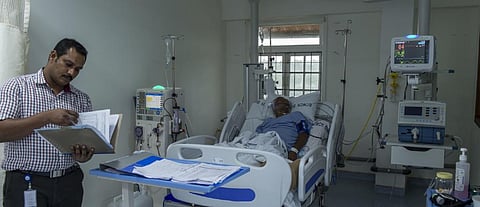

Two days after the Supreme Court ordered guidelines on telemedicine practice in the wake of novel coronavirus (COVID-19) outbreak, the Union Ministry of Health and Family Welfare came with the same on March 25, 2020.
The guidelines were prepared in collaboration with NITI Ayog.
Telemedicine comprises remote diagnosis and treatment of patients by means of telecommunications such video, phone, chatting apps, etc.
India did not have any set of guidelines on the practice till now. There is no legal framework to encourage medical practitioners to provide remote medical consultations during a pandemic.
According to the guidelines, only registered medical practitioners (RMP) enrolled in the State Register or the National Register under the Indian Medical Council Act 1956, can practise telemedicine, but after completing an online course.
The online program will be developed and made available by the Board of Governors in supersession of Medical Council of India. All RMPs will need to complete the course within three years of notification of the guidelines to provide consultation via telemedicine.
According to the guidelines, telemedicine consultation should not be anonymous. The RMP should ensure that there is a mechanism for a patient to verify the credentials and contact details. For issuing a prescription, the RMP needs to explicitly ask the age of the patient.
The document also gave out information on several aspects of telemedicine, including what platforms can be used for diagnosis and treatment and how the technology can be integrated to provide robust healthcare services.
On March 23, the Supreme Court took up a Public Interest Litigation (PIL) seeking to allow guidelines on telemedicine practice to reduce patient-doctor interaction. It asked the health ministry to take a call on the same.
The PIL was filed by Vijay Agarwal, president of non-profit Consortium of Accredited Healthcare Organisations, and health and safety professional Keerthi D’Souza on March 20.
A three-judge bench headed by the Chief Justice of India Sharad Arvind Babode directed the office of Additional Solicitor General of India to ask ministries concerned to look into the matter.
The petition quoted a positive COVID-19 patient in Mumbai who failed to fully disclose his travel history, causing the hospital to be placed under lockdown and several others in isolation.
“Hospitals in India remain at a risk of spreading COVID-19 amongst co-patient and visitors and their family members. India has limited medical resources. Doctors should not be infected during this pandemic,” Agarwal said.
Indian medical professionals, however, have been hesitant to offer remote consultations owing to doubts over legality of the practice.
In 2018, the Bombay High Court denied anticipatory bail to gynaecologists who inter alia prescribed medicines over telephone and were prosecuted under Section 304 IPC that deals with punishment for culpable homicides.
Following this incident, several local medical associations issued directives disallowing their members to do remote consultations.
“Telehealth activities and telemedicine require structured guidelines which finally MoHFW has come up with. Now, they have to be disseminated to medical practitioners to help them fight against COVID-19,” said Ashwini Goyal, president-elect, Telemedicine Society of India.